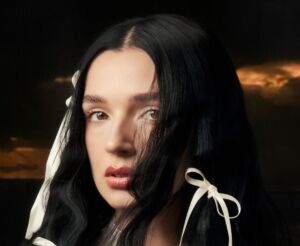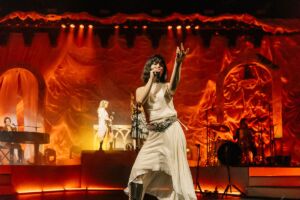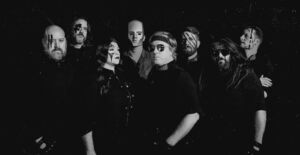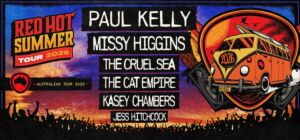
Interview by Bec Harbour
Queens of the Stone Age released Times New Roman last year to critical acclaim and many suggesting a return to the rock/blues-based sound that their earlier records are known for. After Villains, a record that I found I didn’t immediately love and needed many more plays to “get”, the feeling of returning the audience to something more familiar resonated with me as I immediately loved Times New Roman, the way I loved their other albums.
I spoke with Michael Shuman (bass) about Times New Roman, the upcoming the End Is Nero tour and coming to Australia on a humid Friday morning.
Bec – Good morning – it’s super humid here – how are you?
Michael – Good morning – hmmm I like the heat but humidity… don’t really like that.
Bec – I hope you are ready for it when you get here – at least two of the places you are playing on the tour do have fantastic beaches though.
Michael – Can’t wait.
Bec – Let’s get into it – Times New Roman, the third album in what is being called “the Matador trilogy” (this is the third release through the label Matador). It seems that you had a rotating cast of guests on this one like Billy Gibbons (ZZ Top), although despite speculation and rumours, Dave Grohl was not one of them.
Michael – Speaking of speculation and rumours, Billy didn’t actually play on this record. Billy played on Lullabies [to Paralyze] but he didn’t play on this one. This record, we didn’t have any guests, I think it was just such a hard record to make, although we probably should have brought some new energy in there, we decided to keep it private. The only guest that is on there is Matt Helders from Artic Monkeys. He does his doo-de-doo’s on ‘Emotion Sickness’.
Bec – Yeah, yeah.
Michael – That’s literally the only thing, there’s five of us and it was like enough is enough, there’s enough cooks in here already, let’s keep it tight.
Bec – In saying that, Times New Roman was my top album of the year in our end of year retrospective.
Michael – Oh thank you!
Bec – To me it sounds like [Times New Roman] was a step back into the traditional Queens sound, but also incorporating every single step that the band has taken musically. I could see the step from Villains, which was an album that took me a very long time to like, it was very different album with an unexpected producer, Mark Ronson. It was a much slower burn, this one I loved straight away. Yes, it goes back to the more traditional Queens sound but you guys incorporated some of those layers [from Villains]. Can you talk me through the creative process [for Times New Roman]?
Michael – Sure. I appreciate all that. And just to comment on Villains, I do think it was a trick that worked but mostly negatively toward our fans, but I don’t think Ronson had a lot to do with the song writing at all and sonically, he was just like a sixth member of the band and he didn’t produce in the traditional sense. So, I think that by us coming out with the name Mark Ronson in all the promo… and people said that it was a dance record, I think that maybe people thought oh I’m going to listen to this thing, and it’s going to be bad. I think once you go back and listen to that record, it’s a natural progression from Clockwork and Times New Roman is another natural progression with the five of us… I think is the biggest thing.
Because Jon joined at the end of Clockwork so… [Times New Roman] that was our first one altogether. That’s the biggest change that I see. You can really… especially with Times New Roman you can see there was space for everyone to shine and show their individuality, while still not making some record that is isn’t us, that doesn’t feel authentic to us. We are still in the process of… we all have to sign off and high five on everything you know, I love it and maybe that’s why the records have been getting harder and harder. There’s more cooks.
Everyone has an opinion and you know, there’s five strong-minded individuals and when we have an opinion we say it, that can be the hardest part [of the process]. Also, part of our band is you gotta know when, you gotta know your role too. It’s really important, Josh is our leader, he’s our front man, he started the band, and he leads us. He is the prominent songwriter, you can’t have all captains on the ship, you know, and we all have roles on that ship.
The process started and stopped a few times, we had personal things going on for all of us that we needed to wrap our heads around before we could go into the studio. Fully vulnerable, fully comfortable to make this kind of record. It’s a very vulnerable record, especially lyrically.
We started just following the lead and making sure that what [Josh] had to say, what he was feeling… because the most important things are the words, he kinda guided the music to those lyrics. That’s the base of the process, I mean…
Bec – It sounds like a really symbiotic relationship for the band, so for you guys, does Josh bring the lyrics first and you guys put the music together from there or is it more hey, I’ve got a tune and swap bits and pieces back and forth?
Michael – Yeah, as far as lyrics go, there might be an idea or Josh might go “I got this idea for this and the song is called ‘Paper Machete’ … I think I know what it’s about…” and it might start there, but for the most part there might be a guideline and there are others that are formed in the studio, someone starts playing something and we go what’s that? And then we follow that. We have always said that we follow the seed of inspiration, so when there’s something you feel inspired by in cooking, you just go for it, there’s no real rules. And I know for Josh, lyrically, it’s definitely the toughest, it’s hard to be vulnerable.
Me and him spent the last five days in a row, finishing the record, doing the vocals and mixing, my job was to make sure that he was as honest as possible. Although it’s his job to write the lyrics, it’s my job to support him and get them as right as possible.
When you haven’t experienced something, you know covers are really hard when you’re singing someone else’s feelings and experiences, that’s a tough thing to do so all I can do is like talk about it and try to understand as best as possible and support and get the best performances as we can. That’s kinda how it rolls, lyrics to the bitter end, changing words.
Bec – And I have seen Queens of the Stone Age quite a few times, and noticed lyric changes during performance, so I would assume that Josh’s lyrics are a changing process anyway?
Michael – Yeah, yeah and once you come out of the darkness that was around the last few records then you are playing these songs live, and we are in a great zone as a band, you can start joking around with them, right? Lyrics change and you can fuck around, poke fun at the dark, I love that, it doesn’t have to be the same thing, were not punk rock, playing the tracks, there’s no click, whatever happens on stage, it’s a real moment, and you know every night there’s something could go wrong and that’s the danger when we go on, and that’s what’s so fun and that’s what makes me excited for us to keep touring, you know set list is different every night and it keeps it real for the band.
Bec – With the singles from the albums, a lot of bands put out half the album in singles, Queens tend to stick with two to three, is that a conscious decision or is it more about you are moving on by the time it gets to releasing a fourth or fifth single from the album?
Michael – It was tough for us, when we were making this record, we thought for sure there are no singles on this record, we kinda realised there’s not going to be a radio hit, there’s not going to be a single so these singles, I guess in the modern world, for us as a band, Queens of the Stone Age, it’s really hard to have singles and we don’t think about it at all.
We are basically putting out a song, then we are putting out another song, because that’s the way to like keep people engaged, people aware that we’re going on tour, that we’re coming to your city, that’s really the reason for it. You know, there’s no big radio hit. And we’re OK with that.
It’s not the type of band we are and we are really fortunate that we have been able to have fans tell their friends, who tell their friends and we keep growing. It has been amazing to see, without that big music video and radio play, we continue to grow, we feel really lucky and we continue to grow.
Bec – I have thought the last three albums have been albums that you need to listen to as a whole, rather than the sum of parts, they way you guys have tracked them is to listen to beginning to end, I find particularly the last three that I do want to listen from beginning to end to go on that journey that you have created with the tracking, I know artists like Adele have gone up against streaming platforms like Spotify and asked for them to not pull her albums apart as she has tracked the album to create an intended journey.
Michael – Uhuh, yep.
Bec – Is that something that is conscious in your tracking that you want them to listen as the tracking intends? Or is it listener, do as you please?
Michael – No, very much so – I’m glad that you listen to records that way, that’s how I do it (Bec – I listen to mostly vinyl by the way). Right! There you go, exactly! So we make it for vinyl, once we had to start thinking, there’s a vision once we’re in there, we see how the record lays, we had a few ideas and songs that we started recording that we knew weren’t going to make the record because of that thing we were trying to piece together, we went back and forth a lot about track listing because it’s super fucking important to us, and set lists too, the way we create our set list every night it’s not really about what songs we play, its about how they transition that way, but its super important and I wish more people listened that way.
If we get some traction and get some streams and some radio play, it’s really competitive now, I think that’s why it’s changed, although it’s not too dissimilar to how it was in the 50’s and 60’s right, it was single driven, and its funny, maybe in the 70’s is when albums became more prominent, and they became more important as a piece of work.
That’s what we love, that’s what we grew up on, it’s important for us not to stray away from. It’s very intentional, all the transitions are well thought out.
Bec – The tour name – The End is Nero – I really enjoy the word play there – (Michael – that was Troy). The other part of the wordplay that I wanted to ask about was obviously Nero was the emperor that sat and fiddled while Rome burned (Michael – yes). Is there a metaphor for you guys that you’re up there playing, the world seems to be careening in a very wonky direction at the moment, is there that word play there with that as well?
Michael – 100 percent, yeah that is about that. It’s about love and heartbreak and acceptance and grief, definitely at the time we were making it [Times New Roman], the world was burning around us, there’s a lyric in ‘What the People Say’ that says the world is going to end in a month or so, so yes and you know I believe that, this is going to be over soon and (Bec – have fun while you can?) Right, totally (Bec – live the best life you can.) Yes, the older I get the more I want to live that way. That was a big theme on this record for sure. Times New Roman is also playing into that theme.
Bec – I really enjoy that wordplay, I’ll sit there when a new album come out and analyse what the hidden meaning is on song titles. It’s a great activity to try and work out the subtext behind the titles so please keep doing that!
Michael – Thank you!
Bec – Coming out to Australia next month, I wasn’t sure whether this was your fourth or third visit out with Queens?
Michael – It’s gotta be at least four, because Era Vulgaris, Clockwork, Villains, but we did a first one and I think we did one where we just played some festivals, but maybe its five – I dunno.
Bec – You would have seen a lot [on previous tours] is there anything that you want to do when you here, on the bucket list of ‘when I’m here I need to do this’, this time?
Michael – I think like we have done, last tour we did Darwin (Bec – I’m from Darwin) You are?! That was an amazing experience, and really cool to go play there, there’s nothing in the middle of this country but there is other stuff other than those coastal cities [on the east coast], it was really cool to do that, we love going to Hobart and playing there, MONA is my favourite museum in the world so I love going back there.
Bec – you guys are playing there this time.
Michael – This tour, you know I don’t think I am going to do experiences like skydiving or bungy jumping (Bec – or hug a koala). Yeah, I have hugged koalas, petted snakes, I have done all that – on this tour we are expanding to different cities that we haven’t played before. That’s the big thing, we are really happy that we can play that many cities, we don’t want to do Melbourne Sydney Brisbane and Perth if you’re lucky, so I’m really stoked to do those beachside mini-festivals that we are doing, I think that’s the coolest part.
Queens of the Stone Age are touring Australia next month.
QUEENS OF THE STONE AGE – THE END IS NERO AUSTRALIAN TOUR | SUMMER 2024
Sat 10th Feb 2024 – Red Hill Auditorium, Perth *
Tues 13th Feb 2024 – The Drive, Adelaide *
Fri 16th Feb 2024 – Mona Lawns, Hobart *
Sun 18th Feb 2024 – Lookout, Torquay Common, Torquay ^
Mon 19th Feb 2024 – Sidney Myer Music Bowl, Melbourne *
Wed 21st Feb 2024 – Hordern Pavilion, Sydney *
Sat 24th Feb 2024 – Lookout, Broadwater Parklands, Gold Coast ^
Sun 25th Feb 2024 – Fortitude Music Hall, Brisbane *
Mon 26th Feb 2024 – Fortitude Music Hall, Brisbane *
WITH SUPPORT FROM:
* Pond & Gut Health
^ The Chats, Spiderbait, Pond, Gut Health & Lola Scott








